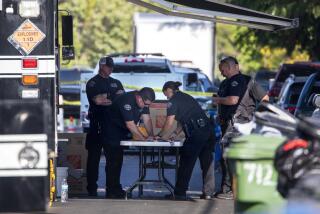Olympic Bomb Investigation Presses On
- Share via
WASHINGTON — One year after a pipe-bomb exploded in a crowded park during the 1996 Olympic Games in Atlanta, FBI agents seem no closer to solving the crime.
Although they have pursued more than 13,000 leads resulting from public appeals for information, no arrests have been made. In fact, their only suspect so far proved to be a public relations disaster.
That was Richard Jewell, a 34-year-old private security guard who was hounded by the media until he was officially cleared three months later. An attempt to trick Jewell into incriminating himself gave the bureau a black eye and has resulted in a disciplinary investigation focusing on a few agents.
Even though the bombing case remains open, Jack Daulton, the Atlanta-based FBI inspector in charge, said in a telephone interview Friday that he is still optimistic.
“Every day we get closer, further along with our forensic work and with people we want to look at,” Daulton said.
“But we’re not ready to make an arrest,” he added, “and I wouldn’t want to say we’ll have one by fall, for example. So it is frustrating, but we’re not totally frustrated yet.”
He said his optimism “is based partly on the fact that we’ve had such good success in the past as an agency, and partly on the fact we’ve got a top-notch team effort on this one.” The case is being pursued by the FBI, bomb experts from the federal Bureau of Alcohol, Tobacco and Firearms and agents from the Georgia Bureau of Investigation.
In response to public appeals for help made in recent months, hundreds of people have turned over videos and photographs that were taken around the time of the bombing, shortly after 1 a.m. on July 27, 1996.
“With 70,000 people in Centennial Olympic Park at the time, you’d think somebody would have a photograph or video with the guy on it,” Daulton said. “That’s what we’re working on.”
Daulton’s personal belief--never before expressed--is that the bomber was trying to kill law enforcement officers who would respond to a warning about the presence of an explosive device in such a crowded setting.
“I believe that’s why a 911 caller said, ‘There is a bomb in Centennial Park. You have 30 minutes.’ And the bomb went off about 20 minutes later,” Daulton said. “I believe that was the intent of the call, but I can’t prove it.”
The bomb killed a tourist and injured 111 other people, including several law enforcement officers. A Turkish photographer died of a heart attack while rushing to the scene.
Daulton said agents are still convinced, as reported earlier this year, that the bombing was connected to bombings at an Atlanta-area abortion clinic and a gay nightclub last January and February. He said the three pipe bombs had similarities, but he refused to elaborate.
Time magazine reported in March that an unusual metal was used in the three devices and that the timers and copper wiring in the fuse mechanisms were similar. Other news reports have said iron shrapnel in all three bombings came from the same foundry.
From photos and videotapes is has examined, the FBI said earlier this month that it has images appearing to show a man wearing a hood sitting on a bench in the section of the park where the bomb went off. The images were taken at 12:19 a.m., about an hour before the explosion. Investigators also have a videotape taken at 12:28 a.m. of a parcel or backpack under the vacated bench that is similar to the green backpack that held the bomb.
The FBI is intrigued because it is trying to identify a man wearing a hooded sweatshirt seen outside the suburban abortion clinic where another of the explosions occurred Jan. 16.
*
On Thursday, the FBI released a second sketch of the hooded man on the bench, showing how he would look without the goatee included in a sketch made public in March. He is being sought as a possible witness but not necessarily a suspect, Daulton said.
Meanwhile, attorneys for 17 people injured in the bombing filed a $100-million lawsuit against Olympic organizers Friday, claiming that the attack could have been foreseen and prevented, Reuters news service reported. The suit was filed in Fulton County State Court against the Atlanta Committee for the Olympic Games; AT&T; Corp., which sponsored the concert targeted by the bombing; and two security firms.
More to Read
Sign up for Essential California
The most important California stories and recommendations in your inbox every morning.
You may occasionally receive promotional content from the Los Angeles Times.










